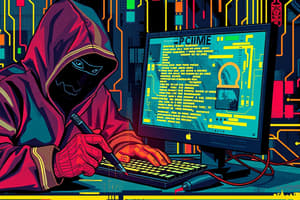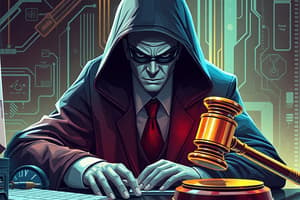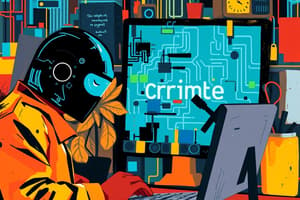Podcast
Questions and Answers
What is a significant factor that complicates the prosecution of computer crimes?
What is a significant factor that complicates the prosecution of computer crimes?
- Ease of technology access
- Jurisdiction challenges (correct)
- Uniform international laws
- High rate of manual investigation
Which of the following best describes the concept of encryption in computer crimes?
Which of the following best describes the concept of encryption in computer crimes?
- A form of disguising one's identity
- A method of synchronizing data
- A means of hiding information (correct)
- A technique for enhancing software performance
What impact does perception of anonymity have on computer crime?
What impact does perception of anonymity have on computer crime?
- Reduces the likelihood of committing crimes
- Can embolden criminals to commit offenses (correct)
- Encourages individuals to act responsibly online
- Helps in identifying perpetrators quickly
In the context of computer crimes, who can be impacted as victims?
In the context of computer crimes, who can be impacted as victims?
What is one of the early forms of computer crime mentioned?
What is one of the early forms of computer crime mentioned?
What was one consequence of the Morris Worm released in 1988?
What was one consequence of the Morris Worm released in 1988?
Which of the following statements about hacking and fraud is true?
Which of the following statements about hacking and fraud is true?
What challenge is associated with international cooperation in handling computer crimes?
What challenge is associated with international cooperation in handling computer crimes?
Which individual is known as perhaps the most famous early hacker?
Which individual is known as perhaps the most famous early hacker?
Phreaking is the practice of manipulating telecommunications carriers for free access to services.
Phreaking is the practice of manipulating telecommunications carriers for free access to services.
What term is used to describe inexperienced hackers who rely on others' programs to exploit vulnerabilities?
What term is used to describe inexperienced hackers who rely on others' programs to exploit vulnerabilities?
The manipulation of access codes and switches in telecommunications is known as __________.
The manipulation of access codes and switches in telecommunications is known as __________.
Match the following motivations for hacking with their descriptions:
Match the following motivations for hacking with their descriptions:
Which of the following describes a 'script kiddie'?
Which of the following describes a 'script kiddie'?
Most of the original ideology behind hacking remains intact today.
Most of the original ideology behind hacking remains intact today.
What was the term initially used for hackers with criminal intentions?
What was the term initially used for hackers with criminal intentions?
Organizations that pose a greater threat in the field of cybercrime are referred to as __________.
Organizations that pose a greater threat in the field of cybercrime are referred to as __________.
Which of the following motivations for hacking could involve insiders like disgruntled employees?
Which of the following motivations for hacking could involve insiders like disgruntled employees?
Which of the following best explains the importance of jurisdiction in computer crimes?
Which of the following best explains the importance of jurisdiction in computer crimes?
Encryption makes prosecution easier for computer crimes.
Encryption makes prosecution easier for computer crimes.
What was the name of the self-replicating computer program released by Robert Morris in 1988?
What was the name of the self-replicating computer program released by Robert Morris in 1988?
The method of hiding information within other non-secret data is known as ______.
The method of hiding information within other non-secret data is known as ______.
Match each term with its correct definition:
Match each term with its correct definition:
What consequence resulted from the crash of AT&T's system?
What consequence resulted from the crash of AT&T's system?
Computer crimes can only affect organizations and not individuals.
Computer crimes can only affect organizations and not individuals.
What is a primary challenge in international collaboration for prosecuting computer crimes?
What is a primary challenge in international collaboration for prosecuting computer crimes?
One of the early forms of computer crime includes the theft of physical ______.
One of the early forms of computer crime includes the theft of physical ______.
What might embolden some individuals to commit computer crimes?
What might embolden some individuals to commit computer crimes?
Study Notes
Degrees of Technical Sophistication in Computer Crimes
- Computer criminals exhibit a range of technical skills, influencing the seriousness of offenses.
- Investigation agencies also vary in technical expertise, affecting their ability to tackle crimes.
Challenges in Jurisdiction
- Traditional jurisdiction is based on crime location, but computer crimes straddle multiple jurisdictions.
- Laws may apply based on the locations of the perpetrator and the victim, complicating legal processes.
International Cooperation Issues
- Lack of collaboration among countries hampers effective investigations and prosecutions.
- Judicial inconsistencies, administrative apathy, and cultural skepticism contribute to these challenges.
Encryption and Steganography
- Use of cryptography (encryption) and steganography (hiding information) complicates legal processes.
- Delays in detection increase the risk of criminals evading capture.
Perception of Anonymity
- The ability to cloak identities may encourage individuals to commit crimes without fear of detection.
Recognition and Definition of Computer Crimes
- Criminal targets vary and can include individuals, organizations, or nations.
- The outcomes of illegal activities differ depending on the nature of the crime.
Importance of Technology in Crimes
- Hacking often requires advanced technology, whereas fraud (like phishing) may utilize basic tools such as email.
Once-Removed Technology in Crimes
- The role of computer technology may be incidental; for instance, online gambling versus fraudulent insurance claims.
Historical Context of Computer Crimes
- Early computer crimes included theft of physical technology and sabotage, such as the destruction of Jacquard’s automated loom in the 19th century.
- In 1986, a KGB hacker accessed MILNET via Tymnet, which was incidentally discovered by a UC Berkeley programmer.
- The Morris Worm, released in 1988 by Robert Morris, spread to over 6000 computers, resulting in millions in damages. Morris was later convicted for violating the Computer Fraud and Abuse Act.
Computer Crime Overview
- Computer criminals vary in technical sophistication, reflected in a continuum of offenses from minor to serious.
- Jurisdictional challenges arise from geographic discrepancies, as laws may apply differently depending on criminal and victim locations.
Investigation Challenges
- Lack of international cooperation complicates investigations due to cultural and administrative factors.
- Encryption and steganography hinder prosecution efforts, making illegal activities harder to track.
- Delays in detection provide criminals with greater chances of avoiding prosecution.
- Perceived anonymity may embolden individuals to commit computer crimes.
Crime Identification Factors
- Targets can include individuals, organizations, or countries, and motivations can range from financial gain to personal vendettas.
- The technological means of committing crimes varies; hacking often requires advanced skills, while other forms of fraud can be as simple as phishing emails.
- The role of technology may be incidental, for example, in online gambling versus fraud cases.
Historical Context
- Early computer crimes included physical theft and sabotage, such as the destruction of Jacquard’s automated textile machine.
- Notable incidents include the 1986 MILNET breach by a KGB hacker and the 1988 Morris Worm that infected over 6000 computers.
- The AT&T crash highlighted vulnerabilities in telecommunications due to software failures.
Notable Early Hackers
- Influential figures include Kevin Mitnick, cOmrade, Terminus, Shadowhawk, and Kyrie, each known for various exploits in hacking.
Phreaking Techniques
- Phreaking involves manipulating telecommunications systems for knowledge or service theft, often using social engineering tactics.
- Techniques included shoulder surfing to steal access codes and using blue boxes to bypass phone costs.
Evolution of Hacking
- Original hacking culture emphasized intellectual curiosity and problem-solving among MIT students, contrasting today's profit-driven motives.
- Motivations for hacking have shifted to include profit, revenge, notoriety, boredom, and more illicit intents.
Hacking Terminology
- Script kiddies are novice hackers using existing tools without understanding their underlying code.
- Cyberpunks are described negatively by law enforcement, reflecting a more destructive behavior on the Internet.
Cybercrime Organizations
- Cyber-criminal organizations present a greater threat than individual hackers, often operating in sophisticated networks.
- Social engineering exploits human factors, making insiders a critical security risk.
Market Classifications
- The black market involves illegal activities, while the gray market includes questionable legal activities by legitimate businesses.
- Data piracy covers various forms of illegal data distribution, including software, film, and technology counterfeiting.
- Internet piracy can manifest as broadcast piracy and theft of signals, whereas technology piracy includes counterfeiting computer components.
Studying That Suits You
Use AI to generate personalized quizzes and flashcards to suit your learning preferences.
Description
This quiz explores the varying degrees of computer crimes and the complexities involved in investigating them. It delves into the impact of technical expertise on the prosecution and the jurisdictional challenges faced by law enforcement agencies. Test your knowledge on the intricacies of computer criminality and the legal landscape surrounding it.




